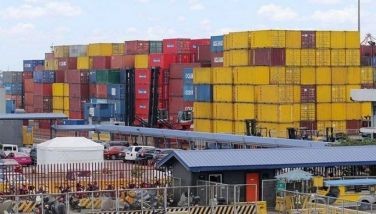Philip Morris Phils to export P95-M tobacco to US this yr
August 20, 2003 | 12:00am
Philip Morris Philippines Manufacturing Inc. (PMPMI), the local unit of Philip Morris International (PMI), will export P95-million worth of Burley tobacco from Isabela province to the United States this year.
PMPMI managing director Chris Nelson said initial exports would consist of 600 tons of Burley Tobacco that will be shipped to PMI manufacturing facilities not only in the US, but also to Turkey, Kazakhstan, Ukraine, Malaysia and Australia.
Burley tobacco is used in the manufacture of PMI’s best-selling global cigarette brands such as Marlboro, Philip Morris and L&M.
Nelson said PMPMI’s export thrust is part of the company’s long-term strategy of expanding its operations in the Philippines despite fears of a slowdown that will result from the passage of Republic Act 9211 or the Tobacco Regulation Act of 2003 which was pushed by anti-smoking advocates.
The new law while hailed by anti-smoking advocates, is being criticized by local tobacco farmers who are unable to sell to manufacturers because of the low quality of their produce.
Nelson, however, said the new law will not discourage PMPMI from pursuing its plans in the country.
"We intend to stay in the Philippines for a very long time. In fact, we see a bright future for the Philippine tobacco industry and the farming communities dependent on it and our export thrust should put to rest fears over the future of the local tobacco sector," said Nelson.
He added that RA 9211 is favorable to cigarette manufacturers like PMPMI.
"The new law provides stability and predictability for tobacco manufacturers like us to build and our business in the country, we can plan better in fact," said Nelson.
PMPMI said Burley tobacco exports will increase in the coming years as the company is now training and assisting about 4,000 tobacco farmers in the provinces of Isabela, Quirino and Aurora.
Nelson said PMPMI is currently beefing up its agronomy program to help local tobacco farmers produce quality crops.
"Producing quality crops is critical to our operations. This ensures us of reliable supply of quality tobacco for our products, while adopting best practices in tobacco farming will enable farming communities to have a sustainable livelihood," said Nelson.
PMPMI managing director Chris Nelson said initial exports would consist of 600 tons of Burley Tobacco that will be shipped to PMI manufacturing facilities not only in the US, but also to Turkey, Kazakhstan, Ukraine, Malaysia and Australia.
Burley tobacco is used in the manufacture of PMI’s best-selling global cigarette brands such as Marlboro, Philip Morris and L&M.
Nelson said PMPMI’s export thrust is part of the company’s long-term strategy of expanding its operations in the Philippines despite fears of a slowdown that will result from the passage of Republic Act 9211 or the Tobacco Regulation Act of 2003 which was pushed by anti-smoking advocates.
The new law while hailed by anti-smoking advocates, is being criticized by local tobacco farmers who are unable to sell to manufacturers because of the low quality of their produce.
Nelson, however, said the new law will not discourage PMPMI from pursuing its plans in the country.
"We intend to stay in the Philippines for a very long time. In fact, we see a bright future for the Philippine tobacco industry and the farming communities dependent on it and our export thrust should put to rest fears over the future of the local tobacco sector," said Nelson.
He added that RA 9211 is favorable to cigarette manufacturers like PMPMI.
"The new law provides stability and predictability for tobacco manufacturers like us to build and our business in the country, we can plan better in fact," said Nelson.
PMPMI said Burley tobacco exports will increase in the coming years as the company is now training and assisting about 4,000 tobacco farmers in the provinces of Isabela, Quirino and Aurora.
Nelson said PMPMI is currently beefing up its agronomy program to help local tobacco farmers produce quality crops.
"Producing quality crops is critical to our operations. This ensures us of reliable supply of quality tobacco for our products, while adopting best practices in tobacco farming will enable farming communities to have a sustainable livelihood," said Nelson.
BrandSpace Articles
<
>
- Latest
- Trending
Trending
Latest
Trending
Latest
Recommended




























